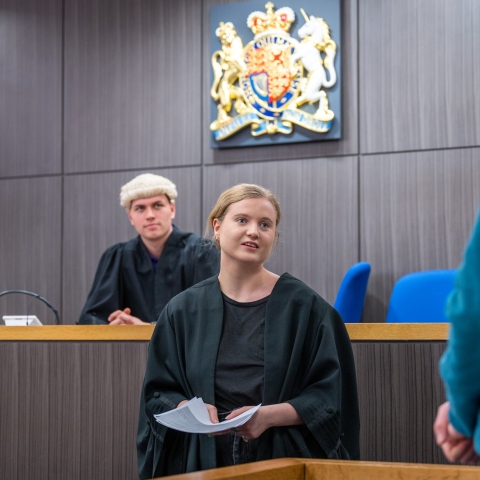
Sidebar navigation

Gaining experience
Law
Gaining experience
Work experience is invaluable and necessary if you wish to pursue a career in law, even a short period of work experience will give you an insight into the practical workings of the legal system and the day-to-day working life of individuals in your chosen profession.
Law firms or chambers expect to see real evidence of work experience on your CV. Targetjobs application timeline will help you understand when to apply for training contracts and qualifying work experience.
Types of opportunities
Below are some examples of the different types of opportunities to gain experience while you study.
Placements usually last between 6-12 months and can be taken as part of your degree programme. While placements may not be in a legal setting, taking a placement will still give valuable commercial awareness which employers are looking for!
To learn more about completing a placement, you can contact the Placements team in the Careers and Employability Service.
Insight days and open days are offered by large law firms to enable students to get a taste of life as a solicitor and may involve participation in skills-based workshops and shadowing a trainee. Some insight schemes are aimed at first year students and these can provide a direct route to vacation schemes the following year. Most insight schemes and open days are offered by firms such as:
Vacation schemes are structured placements with solicitors firms which allow students to experience the typical tasks a trainee would undertake as well as the experience and culture of a firm. Up to 80% of training contract offers can come from vacation schemes, so they are a great way to get noticed for training contracts!
You can find a list of Law firms offering vacation schemes on:
Internships within a wider range of business roles will develop useful skills for a career in law. In particular they will provide commercial awareness. You can find internships through:
Enhance your prospects with hands-on experience through volunteering. The Careers and Employability Service offers current students and graduates access to a Virtual Volunteering Bank, listing roles with organisations such as:
You could also volunteer as an advisor with the University Legal Clinic, by taking the optional ‘Law in Practice’ module, gaining you valuable pro-bono experience!
Where to find work experience opportunities
Some key online platforms include:
Other ways to gain experience
Read on to find out more about the various ways to build work experience in the legal sector
Mini-pupillages offer key experience for those wishing to become barristers, as you experience life in a set of chambers, you will meet those practising at different levels of their career, and gain a grounding in chambers work. Generally students should apply directly to individual chambers, but again do your research on whether an online application is involved or whether to submit a covering letter and CV. Listings of firms offering mini-pupillages can be found on Law Careers website.
Arranging ad hoc work experience or shadowing with a set of chambers or firm of solicitors can often be a good route into gaining valuable experience. The Law Society provides listings of solicitors by postcode.
Make the most of the opportunity to participate in moots at University. Mooting gives you a chance to develop your advocacy skills, strengthen your ability to think on your feet and build your self-confidence, presentation and communication skills.
Marshalling involves shadowing a judge, and gives you the opportunity to build your understanding of court proceedings. The All About Law website offers useful information on what marshalling will involve and how to apply.
The Courts are open to the public, so it is possible for you to sit in the public gallery and observe lawyers, whilst gaining an insight into court procedures. Remember to make a note of any case you sit in on and names of lawyers/judges involved in case you want to make reference to it in future interviews or applications.
Mentoring Schemes put future generations of the legal profession in touch with practising lawyers and solicitors to provide insight into the work of the profession. Information on selected schemes is available from The Law Society, Young Legal Aid Lawyers, Aspiring Solicitors and The Society of Asian Lawyers.
SEO London runs a number of programmes that provide mentoring, support and guidance and connections with firms.
The key to success is to prepare thoroughly, do your research and organise your experience in good time. Explore the various areas of your sector before you apply for work experience; knowing what you want to specialise in will help you focus your research and ensure you gain the relevant skills.
Speculative applications
Speculative applications involve sending a CV and cover letter to an employer to ask if they have any vacancies, even if the company is not currently advertising for a role. They're a great way to access "hidden jobs" that go unadvertised.
Submitting a speculative application shows your interest in a specific company and your willingness to go above and beyond to develop your skills and understanding of the industry.
Learn how to send a speculative application








